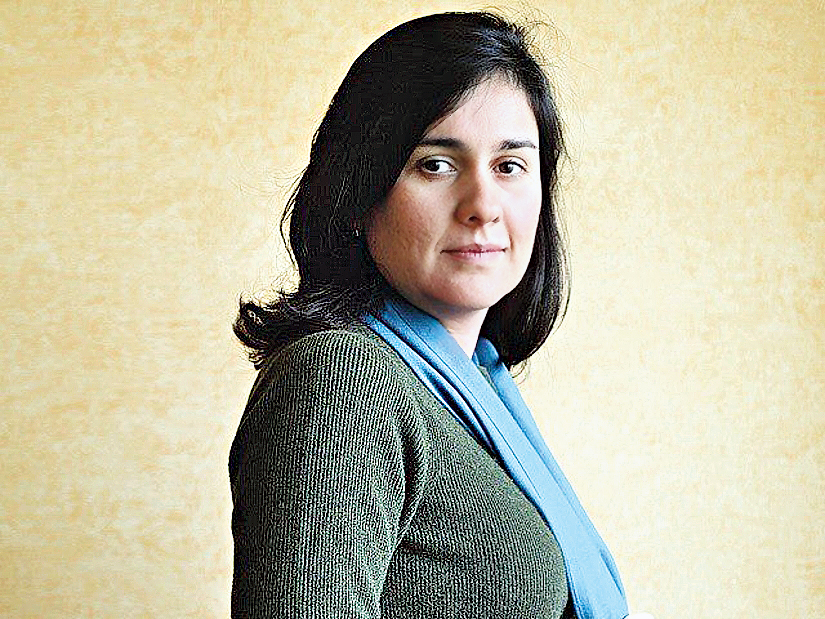The British Pakistani author Kamila Shamsie has been subjected to a curious punishment by the German city of Dortmund which gave her a literary prize only to withdraw it a few days later because of her support for the Palestinian cause.
Shamsie, whose last novel, Home Fires, was longlisted for the Man Booker and won the Women’s Prize for fiction in the UK, expressed her “outrage” at the decision, which ironically has sent her popularity soaring through West Asia and among fellow Pakistanis.
The prize named after the German-Jewish Nobel laureate Nelly Sachs (1891-1970), who was a poet and playwright, is worth 15,000 euros ($16,500) and given every other year to a writer who promotes “tolerance and reconciliation” and cultural relations between people.
On September 6, an eight-member jury announced the winner this year would be Shamsie for her “outstanding literary work”.
She was born in Karachi in 1973, studied creative writing at Hamilton College in Clinton, New York, and now lives in London where she writes well received novels and contributes to Left-leaning publications such as the Guardian and the New Statesman.
Home Fire, which came out in 2016, envisaged a Tory Muslim home secretary — two years before Sajid Javid actually got the job. As a guest editor on Radio 4’s Today programme last December, she interviewed the real life home secretary.
The German jury now says it was previously unaware of Shamsie’s support for a group known as BDS (Boycott Disinvestment Sanctions), which was founded in 2005 by Palestinian activists. In May, the German parliament passed a motion condemning BDS as anti-Semitic and accused its members of utilising “patterns and methods” used by the Nazis during the Holocaust.
BDS responded by accusing Germany of “complicity in Israel’s crimes of military occupation, ethnic cleansing, siege and apartheid”.
The motion was also criticised by 60 Jewish and Israeli academics, who said in an open letter that it was part of a trend “labelling supporters of Palestinian human rights as anti-Semitic”.
It seems jury members were alerted to Shamsie’s Palestinian sympathies by a Right-wing German group called Ruhrbarone.
The group has been accused by BDS activists of encouraging a “genocide against Palestinians” after tweeting an image in November which called for Gaza to be transformed into an open-cast mine with the hashtag #IsraelUnderFire.
The tweet was subsequently deleted.
The jury reconvened on September 14 and “decided to cancel its original vote and to withdraw the award to Kamila Shamsie”.
It said: “Kamila Shamsie’s political positioning to actively participate in the cultural boycott as part of the BDS (Boycott
Disinvestment Sanctions) campaign against the Israeli government is clearly in contradiction to the statutory objectives of the award and the spirit of the Nelly Sachs Prize.”
The prize will now not be given until 2021.
Shamsie asked the jury to include her response in its statement but the request was rejected.
The author said: “In the just-concluded Israeli elections, Benjamin Netanyahu announced plans to annex up to one third of the West Bank, in contravention of international law, and his political opponent Benny Gantz’s objection to this was that Netanyahu had stolen his idea; this closely followed the killing of two Palestinian teenagers by Israeli forces — which was condemned as ‘appalling’ by the UN Special Coordinator for the Middle East Peace Process.
“In this political context, the jury of the Nelly Sachs prize has chosen to withdraw the award from me on the basis of my support for a non-violent campaign to bring pressure on the Israeli government.
“It is a matter of great sadness to me that a jury should bow to pressure and withdraw a prize from a writer who is exercising her freedom of conscience and freedom of expression; and it is a matter of outrage that the BDS movement (modelled on the South African boycott) that campaigns against the government of Israel for its acts of discrimination and brutality against Palestinians should be held up as something shameful and unjust.”
Indian origin author Hari Kunzru expressed his solidarity with Shamsie: “I understand the sensitivities around a prize named for Sachs but deplore the implication that anyone advocating for Palestinian human rights is anti-Semitic.”











